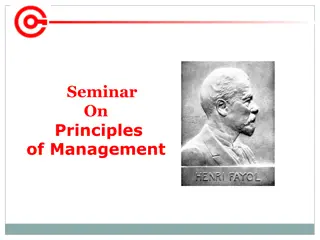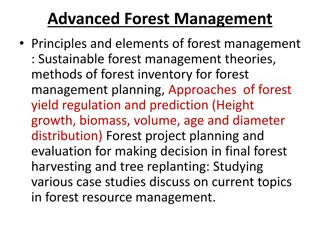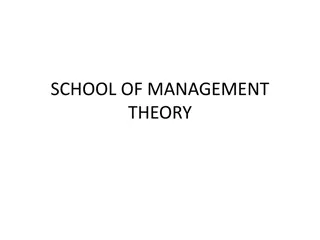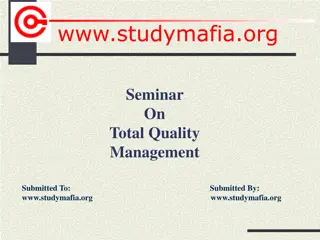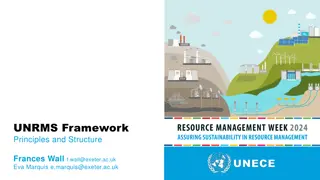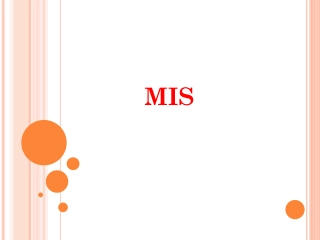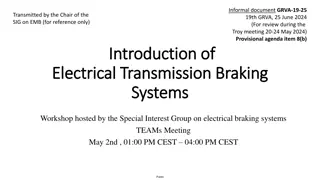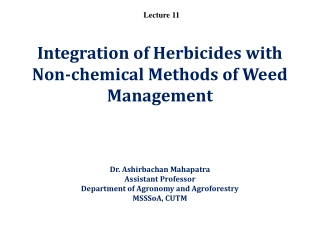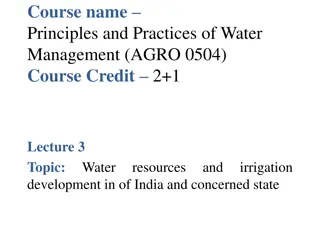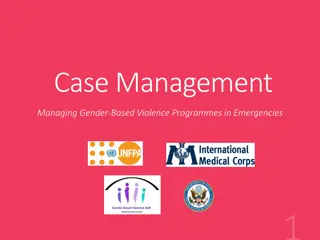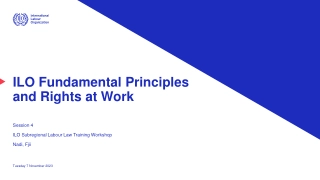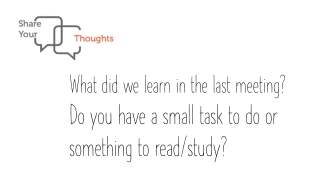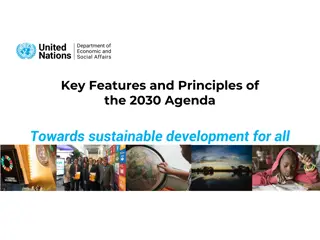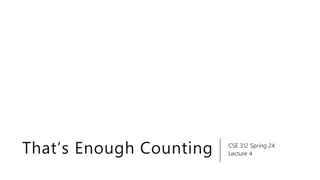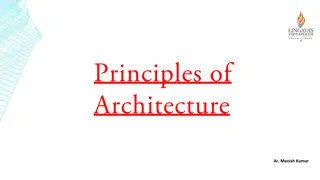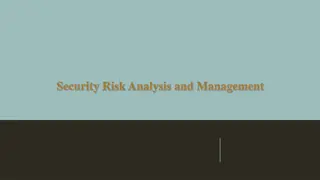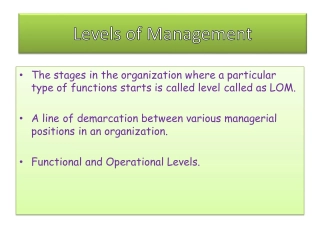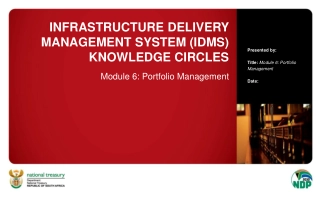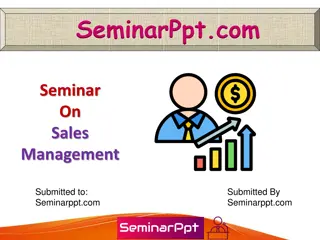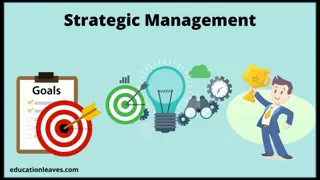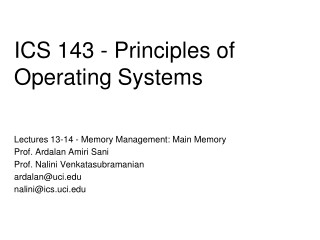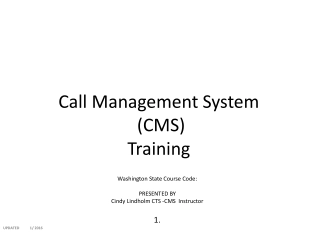Essential Principles of Management
Management is the art of coordinating resources through planning, organizing, directing, and controlling to achieve objectives. It involves motivating and guiding others towards specific goals efficiently. The six Ms of management encompass Men, Materials, Machines, Methods, Money, and Markets, crucial for success in production, sales, and profitability.
Download Presentation
Please find below an Image/Link to download the presentation.
The content on the website is provided AS IS for your information and personal use only. It may not be sold, licensed, or shared on other websites without obtaining consent from the author. Download presentation by click this link. If you encounter any issues during the download, it is possible that the publisher has removed the file from their server.
Presentation Transcript
INTRODUCTION TO MANAGEMENT
Management is concerned with human beings whose behavior is highly unpredictable. Management is found in every walk of life. Management does not perform specific jobs. It motivates other people to perform specific jobs. Management is not doing the work but getting the work done thru the efforts of others.
Definition The art of getting things done through people - Mary Parker Follet Management is the coordination of all resources through the process of planning, organising, directing and controlling in order to attain stated objectives. Henry L. Sisk. Management is principally the task of planning, coordinating, motivating and controlling the efforts of others towards a specific objective. James L. Lundy Management is the art of knowing what you want to do and then seeing that it is done in the best and cheapest way. F.W. Taylor
To manage is to forecast and to plan, to organise to command, to coordinate and to control. Henry Fayol Management is the function of executive leadership anywhere. Ralph C. Davis Management is a distinct process consisting of planning, organising, actuating and controlling performed to determine and accomplish the objectives by the use of people and resources. George R. Terry
Management brings together basic resources popularly known as 6M s Men, Materials, Machines, Methods, Money and Markets. This helps to achieve the expected results quickly and economically in terms of production, sales, profits and goodwill in the market.
Six Ms of Management 1. MANPOWER 2. MACHINES 3. MATERIALS 4.METHODS 5. MONEY 6.MARKETS
1. Manpower Managerial and non managerial personnel's employed in business constitute manpower. Not only survival but also success of an organisation largely depends on its skills, efforts and contributions of its managers. Manpower mobilizes, allocates and utilizes the financial and non financial resources of an organisation.
2. Machines Machines are commonly used to convert raw materials into semi finished and finished products. Machines produce goods at reduced cost of production and also improve its quality. Efficient management of business now a days mainly lies in the use of improved technology.
3. Methods Methods indicate normal and prescribed ways of doing things. Various operations are undertaken as per certain systems and procedures. For every kind of work step by step sequence of actions are suggested which brings about smooth and efficient functioning in the business. The selection of the right methods increase operational efficiency and contribute to effective management.
4. Materials Materials consists of raw materials and semi finished goods which are either converted or assembled into finished products with the help of production process. The quality and cost of finished products depend largely on the quality and cost of materials. It is desirable to maintain adequate stock of materials to face variations in supply.
5. Money Money is the lubricating factor in business. It is not possible to imagine a successful business in the absence of strong financial base. Money is employed to generate more money in the form of profits. Money can be self contributed borrowed from public subscription and banks and adjusted in the form of fixed and working capital.
6. Markets Whether products or services , they need marketing. Successful marketing brings about increased financial resources back to business. Now marketing is the main challenge to every business. Better and improved marketing technique must be implemented to achieve success in business.
Management is a process Management is action based Management involves achieving results thru the efforts of others Management is a group activity Management is intangible Management is aided, not replaced by computers Management is all pervasive 8. Management is an art, science as well as profession 9. Management is dynamic 10. Management has different operational levels 1. 2. 3. 4. 5. 6. 7.
Optimum Use Of Resources 1. 2. Competitive Strength 3. Cordial Industrial Relations 4. Employee Motivation 5. Introduction Of New Techniques 6. Team Spirit 7. Stability & Prosperity To Business Enterprises 8. Social Benefits 9. Labour Turnover & Absenteeism
Management as an economic resource. 1. 2. Management as a system of authority 3. Management as a group activity 4. Management is relative not absolute 5. Management is universal 6. Management as a process 7. Management as a discipline.
Management is described as a distinct process which involves various elements like planning, organising, coordinating, staffing, controlling etc. such management process is essential for achieving specific business objectives in an orderly manner. Management process is a continuous one and run by the managers operating at different levels. This is a process for getting the work done thru others. Management is a distinct process in which managers plan, organise, lead, motivate and control human efforts in order to achieve well defined goals. This is called Management Process.
Luther Gullick gave a new formula to suggest the elements of Management Process PODSCORB P-Planning O-Organising D-Directing S-Staffing Co- Coordinating R-Reporting (Controlling) B-Budgeting
1. Planning It is the primary function of management. It precedes other functions because a manager plans before he acts. It involves the determination of objectives and selecting course of action to achieve desired results. It is the starting point of managerial process. Planning is looking ahead. It is preparing for the future. Effective planning provides answers to questions like What to do? How to do? Who is to do? and When to do? Planning is a function performed by managers at all levels. It is a mental process requiring the use of intellectual facilities foresight, imagination and sound judgement.
2. Organising It is next to planning. It is the function of creating a structure of duties and responsibilities. Organizing involves establishing authority responsibility relationships among people working in groups and creating a structural framework. It involves departmentalization, span of control, delegation of authority and establishing of superior subordinate relationship. A sound organisation avoids duplication of work and overlapping of efforts.
3. Staffing Staffing involves manning the various positions of the organisation. It includes manpower planning, recruitment and selection of the right people, training and developing them, deciding financial compensation, appraising their performance periodically. Right Man for the Right Job is the basic principle in Staffing.
4. Directing Directing deals with instructing people to do the work in the right manner. It also includes guiding, motivating, supervising and leading people towards the attainment of planned objectives. It is the responsibility of managers at all levels. They have to work as leaders of their subordinates. In leading the people, the manager performs the following three distinct tasks: Communication : the process of information flow from one person to another and across the organization; Leadership : the process by which a manager guides and Influences the work of his subordinates; and Motivation : the act of stimulating the people so that they give their best to the organisation.
6. Coordinating Proper coordination of activities of different departments are essential for achieving the objectives. Coordination is rightly treated as the Essence of Management. Coordination avoids misdirection and wastages and brings unity of action in the organisation Coordination will not come automatically or on its own. Special efforts are necessary on the part of managers for achieving such coordination.
7. Controlling Planning and controlling the two functions are closely interrelated in that while plans specify the objectives to be achieved, control as a managerial function facilitates to know whether the actual performance is in conformity with the planned one. In the event of deviations, appropriate corrective measures could be taken. Controlling implies measuring and correcting the activities to ensure that events conform to plans.
A role is a set of expectations for a managers behavior. Henry Mintzberg studied the role of managers and classified it into 3 categories : Interpersonal Role 2. Informational Role 3. Decisional Role 1.
1. Interpersonal Roles Role Description Figure head Symbolic head; obligated to perform routine duties of a legal and social nature. greeting visitors, attending weddings of employees, lunches with important customers. Leader Responsible for the motivation and activation of subordinates; responsible for staffing, training and associative duties. Liaison Nurtures and maintains network of outside contacts. The liaison role involves interface activities with environment. attending meetings, conferences, changes in environment.
2. Informational Roles Role Description Monitor Scan the environment for information. Collect and study information and determine how it influences his business. periodicals, reports, personal contact Disseminator Transmits information received from both within and outside the organization to members of the organization phone calls, memos, meetings. Spokesman Transmits information to stake holders about external environment and organization s plans, policies, actions, results, etc.
3. Decisional Roles Role Description Entrepreneur Play with new ideas for product improvement or product addiction. Adapting to changing environment. Open to suggestions. Conflict handler Acts has a fire fighter, works as an arbitrator to solve differences Resource allocator Delegate authority to subordinates, allocate funds for new equipment, advertising, pay rise Negotiator Negotiates with union leaders to strike a deal for issues, negotiates price with distributors.
A manager occupies executive position and needs certain managerial skills so as to perform his duties in an efficient manner. The skills which a manager requires can be termed as Managerial skills. The managerial skills was initially suggested by Henri Fayol and was made popular by Prof R.L. Katz. They are classified under three heads TECHNICAL, HUMAN AND CONCEPTUAL SKILLS.
1. Technical Skills Technical skills involves specialized knowledge and competence in the use of distinctive managerial tools and techniques. This skill is necessary in the case of managers working at the supervisory levels i.e. lower levels. A supervisor is mainly concerned with directing and controlling subordinates and needs technical skill. The importance of technical skills reduces when the manager moves to the higher levels.
2. Human Skills Human skills refers to the ability of managers to interact with the subordinates and to build team spirit at all levels. This skill creates favorable atmosphere and facilitates willing cooperation of employees. All managers especially middle level managers need human relations skills. This skill is useful to understand feelings, sentiments of other, undertake self evaluation etc.
3. Conceptual Skills It is a combination of vision, imagination and intelligence that assures perspective in viewing the organisation and its future. This skill indicates the ability of a manager think about the future of his organisation, his ability to do abstract thinking and his ability to assess the environmental changes. These skills enables a top level managers to set appropriate organisational goals for himself and for his team.
A professional managers should possess more skills in addition to the above three skills. : Diagnostic Skills Analytical Skills Administrative Skills Behavioral Skills
4. Diagnostic Skills It includes the ability to analyse, examine and determine solution to management problem. This skill identifies key factors and understand how they inter relate to one another. A manager can effectively use this skills with a proper blend of analytical ability with common sense and intelligence.
5. Analytical Skills This skill uses scientific techniques to solve management problems. This skill identifies key factors and understands how they interrelate to one another. It is actually an ability to diagnose and evaluate. Without analytical skill, there is no hope of long term success.
6. Administrative Skills Managers working at the top management levels have to contribute towards framing plans and policies. They are expected to coordinate various activities and ensure conflict free working of the business, they install and carry out procedures to check progress of activities against plans.
7. Behavioral Skills Behavioral Skills are necessary to coordinate, control and direct the activities of the subordinates. This skill enables managers to understand the behavior of people by respecting their feelings and understanding their problems. This leads to improved communication with subordinates who will be motivated to put in their efforts.
Evolution of Management 1. F.W. TAYLOR 2. HENRY FAYOL
1. Classical Approach to Management Classical Approach to management supports the body of management thought based on the belief that employees have only economical and physical needs. The social needs and needs for job satisfaction either does not exist or are unimportant. It advocated high specialisation of labour, centralised decision making and profit maximisation. Classical approach is the oldest school of management thoughts. It started around 1900 and continued into the 1920 s. It is primarily concerned with increasing the efficiency of workers and organisation based on management practices.
Classical Approach Bureaucratic Management Administrative Management Scientific Management
a) Bureaucratic Approach to Management Max Weber, born to a wealthy family that had strong political ties in Germany, became a sociologist, editor, consultant to government, and author. Because of his various positions, he experienced the social upheaval brought on by the Industrial Revolution. He saw the emerging forms of organization as having broad implications for managers and society. He believed in strictly following rules which would make bureaucracy highly efficient form of organisation founded on principles of logic, orders and legitimate authority.
Features of Bureaucratic Organisation Clear act of division of labour based on competence and functional specialisation. A well defined hierarchy of authority. A bureaucrat seeks rationality, objectivity and consistency for his organisation. Interpersonal relations are based on positions and not personalities. A system of rules covering the duties and rights of employees. A system of procedures for dealing with work situations. Selection and promotion based on technical competency. Bureaucracy recognizes only legal power and authority given to each position in the organisation. 1. 2. 3. 4. 5. 6. 7. 8.


